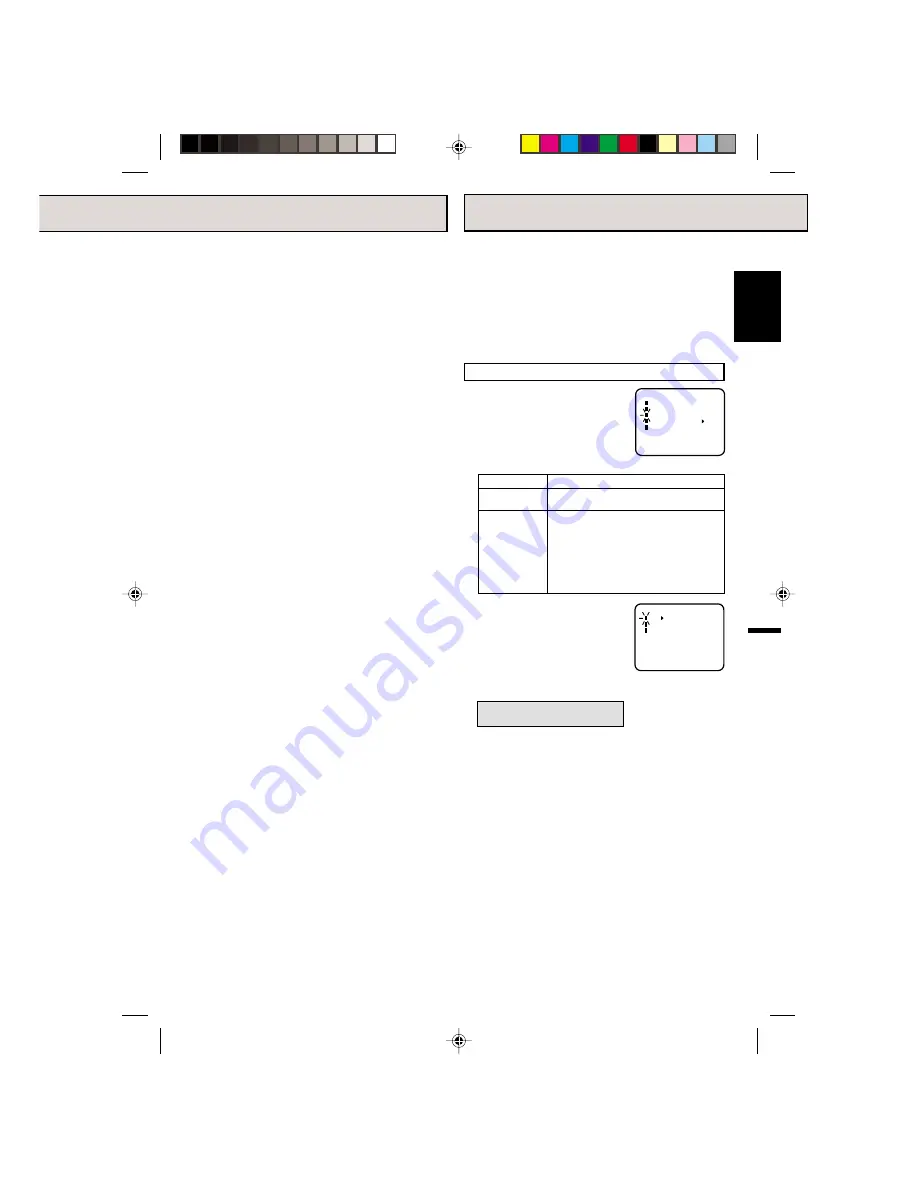
15
ENGLISH
Captions: This Closed Caption Mode will display text on
the screen in English or another language (depending
on the setting of the Closed Captions CH. 1 or 2).
Generally, Closed Captions in English are transmitted on
Captions Channel 1 and Closed Captions in other
languages are transmitted on Captions Channel 2.
Text: The Text Closed Caption Mode will usually fill the
screen with a programming schedule or other information.
After selecting a Closed Caption Mode, it will stay in
effect until it is changed, even if the channel is changed.
If the Captions signal is lost due to a commercial or a
break in the signal, the Captions will reappear when the
signal is received again. If the channels are changed,
the Captions will be delayed approximately 10 seconds.
The Captions will appear in places on the screen where
they will least interfere with the picture, usually on the
bottom of the screen. News programs will usually show
three-line Closed Captions which scroll onto the screen.
Most other shows provide two or three lined Captions
placed near the character who is speaking so the viewer
can follow the dialogue.
Words in italics or underlined describe titles, words in
foreign languages or words requiring emphasis. Words
that are sung usually appear enclosed by musical notes.
For television programs broadcasting with Closed Cap-
tions, look in your TV guide for the Closed Captions
symbol (CC).
• When selecting Closed Captions, the captioning will
be delayed approximately 10 seconds.
• If no caption signal is received, no captions will
appear, but the television will remain in the Caption
Mode.
• When Captions are being displayed, on-screen
displays, such as volume and mute may not be seen
or may interfere with Closed Captions.
• Misspellings or unusual characters may occasionally
appear during Closed Captioning. This is normal with
Closed Captioning, especially with live programs. This
is because during live programs, captions are also
entered live. These transmissions do not allow time for
editing.
• Some cable systems and copy protection systems
may interfere with the Closed Captioned signal.
• If using an indoor antenna or if TV reception is very
poor, the Closed Caption Decoder may not appear or
may appear with strange characters or misspelled
words. In this case, adjust the antenna for better
reception or use an outdoor antenna.
1
Press the MENU button.
2
Press the SET/TR or
– button to select the CH SET-UP
mode, then press the ENTER
button.
5
Press the MENU button until the MENU screen is cleared.
M E N U
TIMER REC SET
TV SET-UP
CH SET-UP
AUTO REPEAT ON OFF
SYSTEM SET-UP
〈
+/–/ENTER/MENU
〉
CH SET-UP
TV CATV
AUTO CH MEMORY
ADD/DELETE
〈
+/–/ENTER/MENU
〉
3
Press the SET/TR or
– button to select the TV/CATV
mode.
4
Press the ENTER button to
select the TV or CATV mode.
The arrow indicates the selected
mode.
This TV/VCR is equipped with a channel memory
feature which allows channels to skip up or down to
the next channel set into memory, skipping over
unwanted channels. Before selecting channels, they
must be programmed into the TV/VCR’s memory. In
addition to normal VHF and UHF channels, this TV/
VCR can receive up to 113 Cable TV channels. To
use this TV/VCR with an antenna, set the TV/CATV
menu option to the TV mode. When shipped from the
factory, this menu option is in the CATV mode.
VHF/UHF/CATV CHANNELS
TO MEMORIZE CHANNELS
TV/CATV SELECTION
TV
VHF
2-13
UHF
14-69
CATV
VHF
2-13
STD/HRC/IRC
14-36 (A) (W)
37-59 (AA) (WW)
60-85 (AAA) (ZZZ)
86-94 (86) (94)
95-99 (A-5) (A-1)
100-125 (100)(125)
01 (5A)
TV
- VHF/UHF channels
CATV - CABLE TV channels
5A42201A E P12-19
17/4/2002, 13:32
15
















































